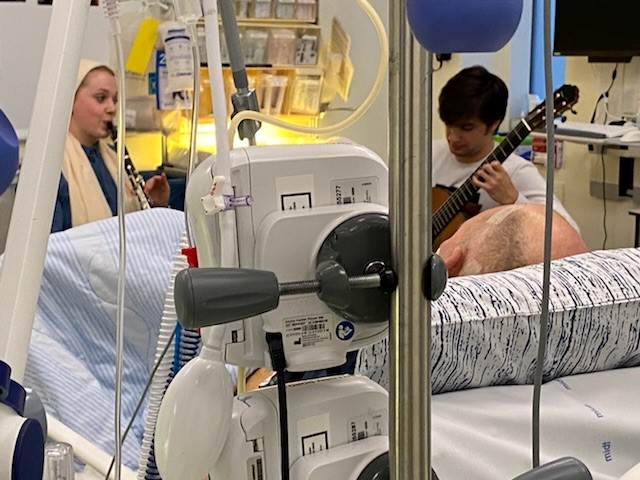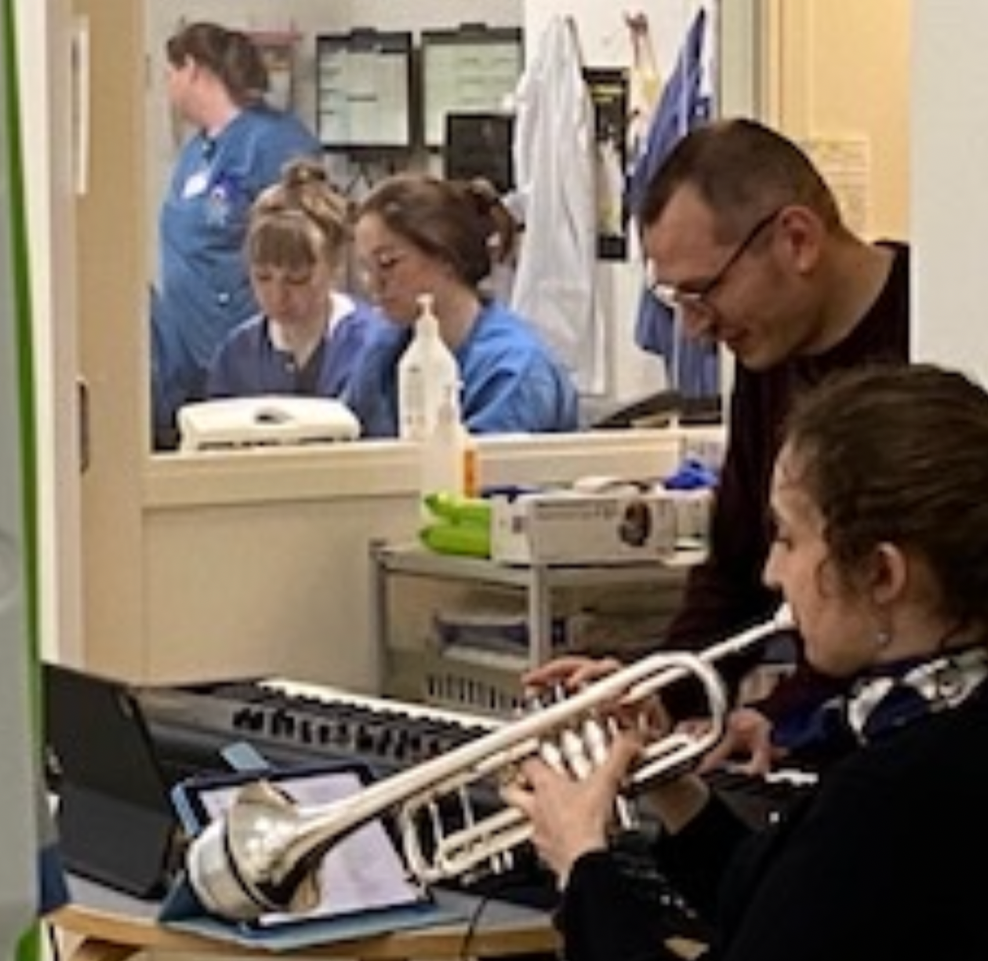'Meaningful moments – live music in the ICU' / Culture in Hospitals
This project was implemented by The University Hospital of Aarhus and The Royal Academy of Music, Aarhus/Aalborg
Context
The Central Denmark Region is committed to improving the management and treatment of illnesses in recognising the role of culture in enhancing patient experience and well-being. To this end, the region was allocating new funding to support cultural projects in hospitals.
The intensive care unit (ICU) Nord 2 at Aarhus University Hospital is constantly working on improving the environment around the intensive care patient to improve survival and strengthen patient’s recovery. Right now with a cognitive rehabilitation programme funded by the Novo Nordic Foundation.
The Royal Academy of Music, Aarhus/Aalborg works purposely with artistic citizenship as an educational strategy - a world-facing approach, where musicians contribute to society with high-artistic quality combined with empathy and sensibility targeting the needs among for instance patients in the healthcare environment.
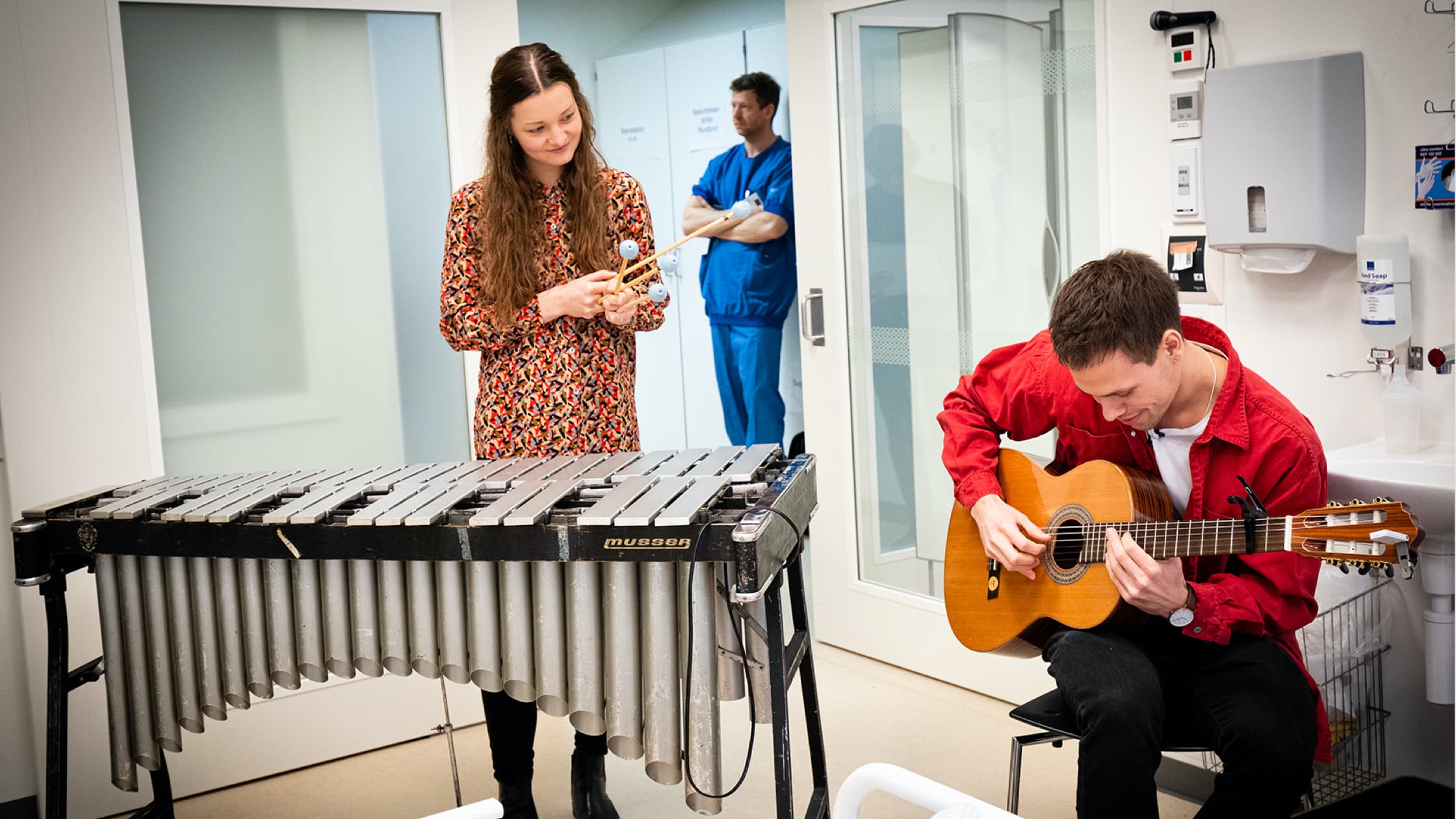
Intervention
A key factor of the project was developing a strong interprofessional cooperation between The University Hospital of Aarhus and The Royal Academy of Music - between healthcare professionals and musicians - to ensure high quality standards and to develop a mutual field of practice for the benefit for patients, relatives, health care professionals, musicians and the institutions involved.
Objectives
The core of this project was to create sustainable concepts that combine high quality musical activities with health promotion factors. The aims were threefold:
1) to strengthen patients' mental and physical well-being
2) to improve patient contact, compassion and job satisfaction among health care professionals
3) to create new job opportunities for musicians
The patient perspective
- The primary objective was in a multiple methods design to explore the experience of live music among adult patients admitted to the intensive care unit (ICU). The secondary objective was to investigate whether live music promotes well-being and reduces stress and pain for adult patients admitted to ICU.
The healthcare professional perspective
- In progress. The Primary objective is to investigate the nurses experiencence of live music in the Intensive care unit - both personal and professional perspective.
The musicians perspective
- The primary objective was to explore the experience among music students offering patient-tailored bedside interventions for intensive care patients. What were the underlying mechanisms behind this kind of artistic practice and to what extent would it deepen and create new meaning of musicianship.
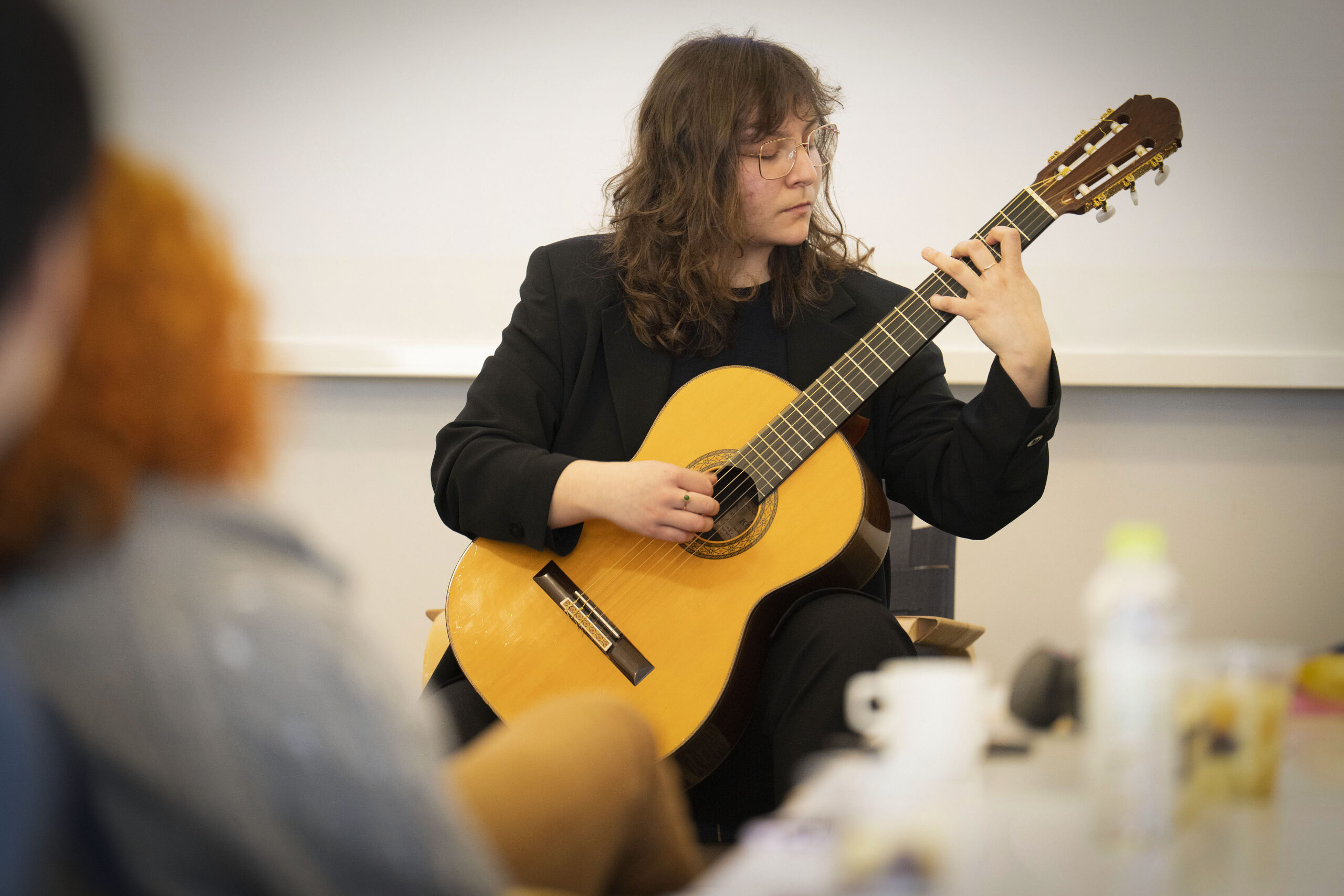
Format
The design of the project was based on purposive sampling and mixed methods in regards of collecting and evaluating data.
Figure 1 illustrates the threefold research framework for this project – the patient, healthcare professional and the musician perspective. To date, both qualitative and quantitative data have been collected, and we will publish three scientific articles during 2023. In this report, only preliminary data from the patient perspectives will be reported, as the other articles still are in progress.
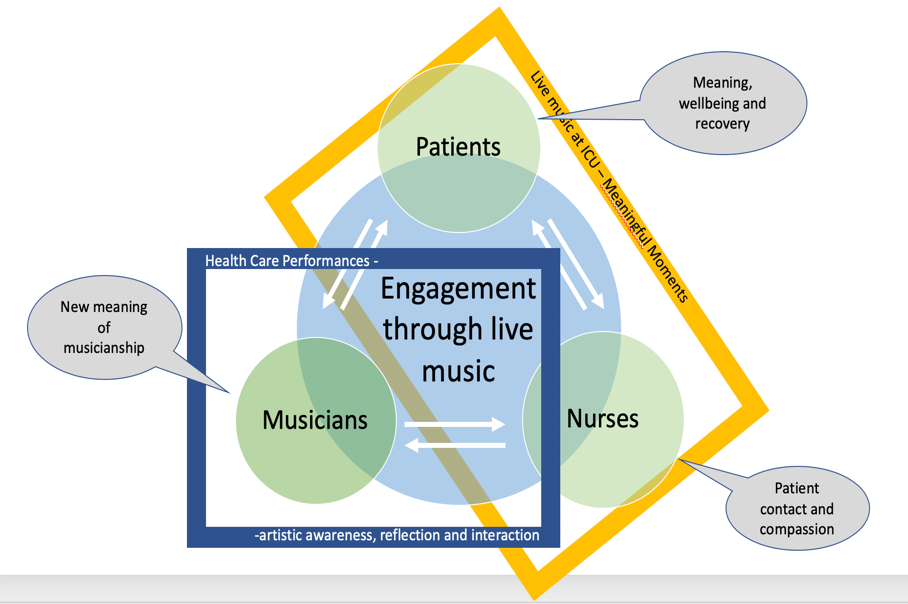
The method af the project was to collect data at the University Hospital in Aarhus from February 2020 to December 2021. A total of 27 patients met the inclusion criteria and participated in the study. The qualitative component consisted of participant observation and interviews with patients. Data was analyzed using NVivo 12. The quantitative component consisted of pre-post measurements of heart rate, blood pressure, the patient's subjective experience of pain, and heart rate variability. Data was analyzed using STATA with descriptive statistics, paired t-test, and Wilcoxon Signed Rank Test.
The daily schedule is shown in figure 2. In the morning the musicians met the nurse in charge for initial briefing of todays schedule. Then the musicians performed for the healthcare professionals in the coffee room after which the musicians offered 1-1 patient-tailored bedside music sessions in the patient rooms.
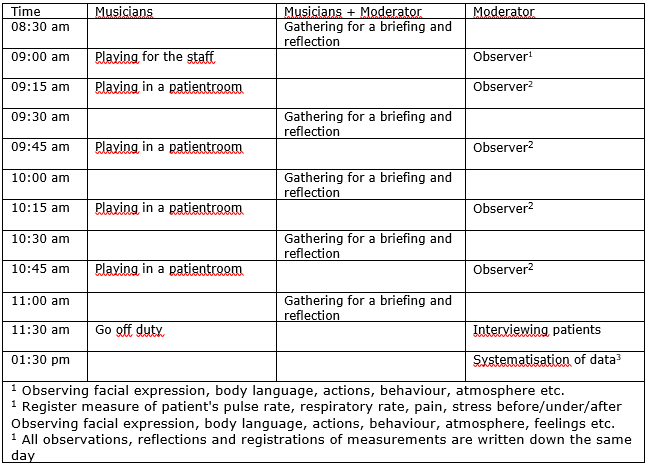
A total of 27 patients met the inclusion criteria and participated in the study from February 2020 to December 2021. The qualitative component consisted of participant observation and interviews with patients. Data was analysed using NVivo 12. The quantitative component consisted of pre-post measurements of heart rate, blood pressure, the patient's subjective experience of pain, and heart rate variability. Data was analysed using STATA with descriptive statistics, paired t-test, and Wilcoxon Signed Rank Test.
Through a Ricoeur-inspired analysis strategy, the qualitative observations and interviews revealed four themes describing how the music gave the patients a break where they could swim away and relax and the music being live makes the music unique. Further, the music brought forward happy memories from the past and longing for home", and was described as an intense and meaningful experience. Live music has great importance and value for the intensive care patient. The living presence makes the music intervention more empathetic. The quantitative analysis showed a significant positive difference in pulse, respiratory rate, blood pressure, pain experience, and heart rate variability after the music intervention.
Live music contributes to meaningful moments, promotes well-being, infuse vitality, hope, and joy, and supports the framework for healing and recovery in a high-tech environment. There was a significant reduction in all measurable parameters after the music intervention, and all patients want more musical experiences. Live music is a non-pharmacological and non-invasive experience that makes a difference for critically ill intensive care patients.
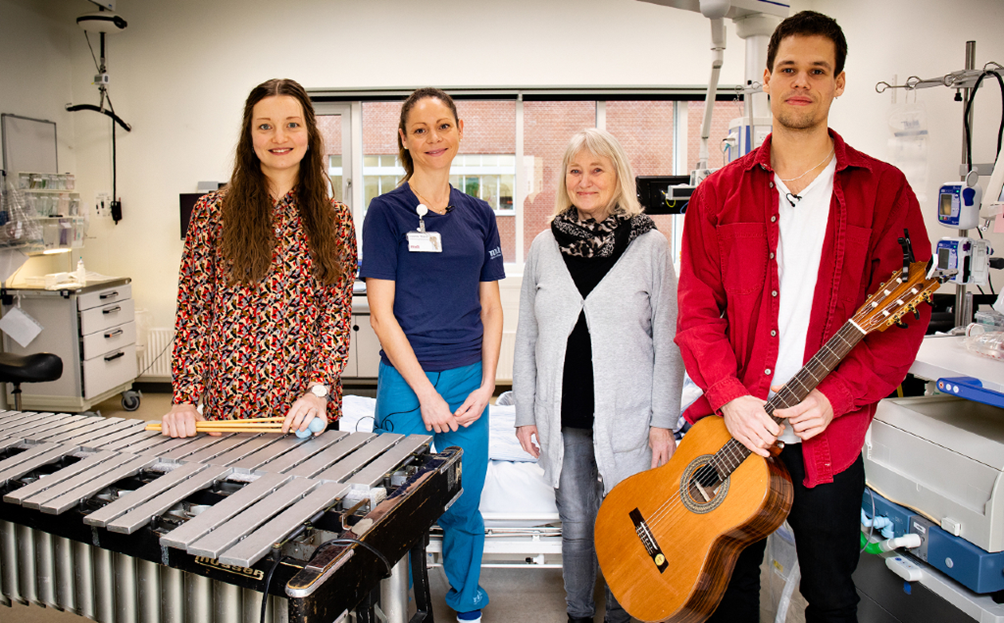
- Link to the 'Healthy Ageing through Music'-paper: Meaningful Music in Healthcare
Impact
The project explored the use of live music as an intervention in adult intensive care units. The study found that live music has a positive impact on patients and their families, generating a mental space that provides meaningful moments of hope and peace, and functions as a catalyst for positive memories, hopes, and dreams. The presence of live music is seen as a break from the clinical, mechanical, and instrumental hospital environment and a transcendence of the hospital's structures and premises.
The study indicates that live music has a releasing effect on the relationship between patients and health professionals, opening up dialogue between them.
Another of the outputs of this project was the development of concrete sustainable concepts for collaborations between cultural actors and the health service. By ensuring sustainable business models, accessibility, quality assurance, involvement of healthcare professionals, and institutional anchoring, the healthcare sector gained a more holistic view, including both psychological and physiological components in the process of delivering the best possible treatment.
Further, the project's results was presented internationally at the CultureForHealth conference in March 2022, organized by Central Denmark Region and co-financed by the European Commission. The aim of the conference was to spread and strengthen good solutions within the field of culture and health, and to help healthcare providers, cultural institutions, and decision-makers to recognize the potential of this field.
The impact of this intervention has been complementing biochemical health solutions with cultural activities and interventions in an intensive care unit and has had several impacts:
- Improved patient experience: The use of live music has generated a mental space for patients, providing them with a break from the demands and obligations of being in the hospital. This can contribute to a more positive experience for patients during a critical illness.
- Enhanced communication between healthcare professionals and patients: The live music can serve as a catalyst for good memories, hope, and dreams, and contribute to seeing the patient as a whole person. This, in turn, can lead to improved communication between healthcare professionals and patients, as well as their family members.
- Aesthetic break from clinical surroundings: The presence of live music is an aesthetic break from the clinical, mechanical, and instrumental hospital environment. This can contribute to a more pleasant and comfortable atmosphere for patients.
- Potential for a wider implementation of music interventions: The results of the study suggest that live music has significant benefits for intensive care patients. This could be used to support arguments for implementing a comprehensive music strategy at AUH and spreading live music throughout the hospital.
- Increased awareness of the potential benefits of music interventions: The project's results was presented internationally at the CultureForHealth conference in March 2022.
Overall, the project suggests that live music can have significant positive impacts on patients in intensive care and that a comprehensive music strategy could be implemented at AUH and extended to the entire hospital in the future.
Read about similar initiatives:
- 'Sammen om levende musik' (SOL) – 'Together in Live Music' - two articles
Link to article 1: Live music during haemodialysis A multiple methods randomised controlled pilot study
Link to article 2: Musical Breaks
The pilot project was carried out by the project group:
Pia Dreyer, RN, PhD, Professor, Aarhus University Hospital, Department of Intensive Care
Linette Thorn, RN, CCRN, MScN Aarhus University Hospital, Department of Intensive Care
Keld Hosbond, acting principal, The Royal Acadamy of Music, Aarhus/Aalborg
Margrethe Langer Bro Pianist, ass. professor, Phd, The Royal Academy of Music, Aarhus/Aalborg



